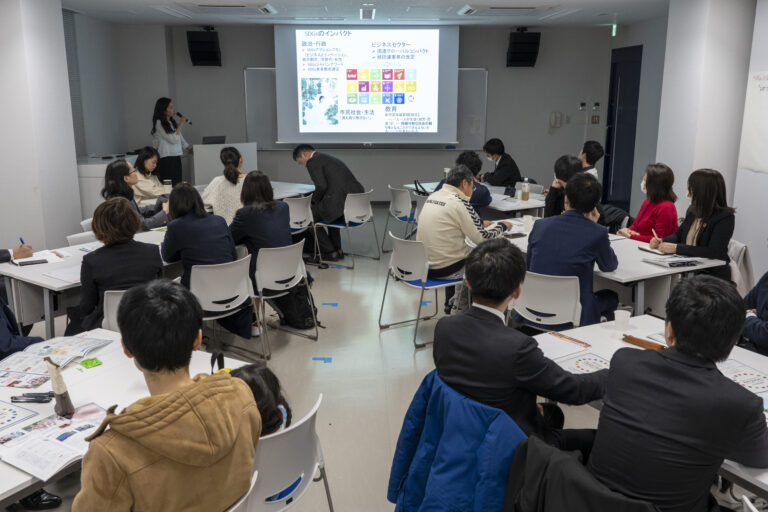2020 is the year of the Tokyo Olympics. As the interest in sports has increased with each passing day, this time at the SDGs café, we focused on Sports and how they relate to the SDGs.
Our first guest was Ms. Haida, Deputy General Manager of the Business Planning Department and Hometown Promotion Office of Zweigen Kanazawa Football team (J2).
The J League (Japan’s professional football league) has three philosophies, one of which is “promoting a rich sports culture and contributing to the healthy development of the mind and body of the people.” In other words, there is a strong desire to develop Japanese sports culture through football.
Zweigen Kanazawa has a club philosophy: “Challenge the tradition of this city.”
“In Kanazawa, there are many things that are said to be ‘tradition’. We are trying to make ‘challenging’ a new Kanazawa tradition,” Ms. Haida said.
J-League clubs conduct 20,000 community engagement activities a year to gain more supporters as well as the favor of the local community. Last year, Zweigen Kanazawa conducted 250 such activities, including a football training session for kindergarten kids, support for the blind football team “Zweigen Kanazawa BFC”, and football lessons to help rehabilitate patients with mental illnesses.
All 56 clubs in the J-League have performed about 20,000 community engagement activities in the year 2019. However, despite their efforts, there was still a lack of awareness of their activities in the local community. As such, two years ago on the 25th anniversary of the J-League they decided to start “Sharen” in addition to their regular activities.
“Sharen” is an abbreviation of “social cooperation activity” in Japanese. Zweigen Kanazawa has been working with companies, governments, schools, and other local groups to solve social issues in the community. Before starting Sharen, they focused on quantity, but now they are more focused on the quality of the activities.
Our second guest was the SDGs expert Mr. Cosmo Takagi, a Research Associate at UNU-IAS OUIK as well as a Research Assistant at Keio University. He also has experience learning football in Brazil, so he was a perfect speaker for this workshop.
He first explained what the SDGs are with examples and explained an important theory of the SDGs: backcasting. There are 17 goals in the SDGs, so we need to think ahead and define our goals and then work backwards to identify policies and programmes that will help us achieve those specific goals. This planning process is vital to achieving the SDGs.
”How do you use the SDGs in connection with the J-League?”
One way to use the SDGs is to organize. For example, a J3 team called “YSCC Yokohama” is sending a team of nutritionists to an impoverished area and teaching the residents how to make a nutritionally balanced meal at a low price. This activity contribute to the second goal of the SDGs: Zero hunger. However, this is very broad in terms of goals, and it seems that anything can be linked.
The SDGs have 169 targets and indicators for their progress. Looking at the targets and indicators, we can see that there is a concept of “eliminating undernourishment” and that we are contributing to it.
“When organizing our efforts in the SDGs, look at specific targets rather than the overall goals. The targets are so specific that we can organize our efforts in a meaningful way,” Mr. Takagi said.
Some further examples he gave included Kawasaki Frontale’s contribution for SDGs goal number 4, Quality Education, where the team donated maths workbooks to kids to learn basic maths by counting football game scores.
The UK’s Forest Green Rovers FC is known as the world’s most environmentally friendly club, and is certified as such by the United Nations. They attached solar panels to their stadium which supply all of the electricity the stadium requires with solar power.
During the group discussion session, participants discussed what kind of activities we can organise to promote SDGs with sports, what can lead to the achievement of Kanazawa’s SDGs using sports.
Some of the opinions of participants are as follows:
“Nobody at our table really plays any sports, so we talked about how we can individually enjoy and support sports.”
“We would love to host an event where children and football players can play together”
“It would be easier for disable people, people with illnesses, and elderly people to go to the stadium if there were more transportation options to get to the stadium and more accessible toilets.”




